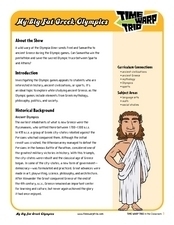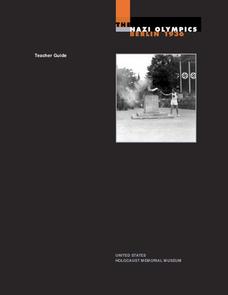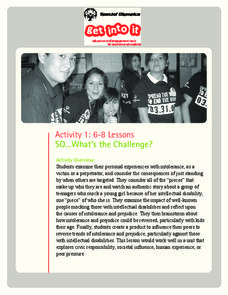Time Warp Trio
My Big Fat Greek Olympics
The Olympic Games are indeed a significant and far-reaching cultural component in our international community today, but from where do they originate? Where do our traditions stem from, and how do we choose the sports that constitute...
Anti-Defamation League
Is Olympic Coverage Sexist?
Women Olympians have come a long way since 1900 when 22 women competed for the first time. News coverage of the Olympics has also changed dramatically. What has been slow to change, however, is the language used in the coverage of female...
Teacher Vision
Political Events and Summer Olympic Games
During an Olympics year, the world joins together to celebrate athleticism, patriotism, and history. Learn about the Olympiads of the 20th century with a research project in which groups research one year's Olympic Games. They note the...
US Holocaust Museum
Nazi Olympics: Berlin 1936
The Olympics are about more than sports—at times, the games are also a place of racism and prejudice! Pupils investigate the 1936 Olympics in Berlin, Germany. They analyze the meaning behind the materials included in the United States...
Anti-Defamation League
What is the Soul Cap and Why Was it Rejected for Olympic Use?
In 2021 the FINA, the International Swimming Federation, banned using Soul Caps in the Tokyo Olympics. Middle schoolers investigate why the committee made this decision and the resulting backlash, including charges of discrimination and...
Curriculum Development Institute
Olympic Games
The Olympic Games are the subject of a differentiated lesson for a middle school classroom. Activities include researching the events in the ancient games and comparing them to events in the modern Olympics, gathering acts about why...
Curated OER
Home Olympics
Here's a great way to host a simulated Olympic Games at school. Together, everyone designs an obstacle course, plays balloon volleyball, tumbling tornadoes, crosses the brook, and takes part in a cooperative race. If you want to, you can...
EngageNY
Reading to Determine Important Relationships between People and Events: The Importance of the 1936 Olympics for African Americans (Promises to Keep, Pages 16–19)
Scholars look at cause-and-effect relationships while doing a close read of the 1936 Olympics on pages 16-19 of Promises to Keep. They complete a cause-and-effect note catcher and add their ideas to an anchor chart. Readers then work...
Curated OER
Learning From the Past
Coming up on the Olympics? Be sure your middle schoolers understand the dynamic and ancient history of this global tradition. They begin by recalling traditions parents have passed down, considering their relevance and ways they might be...
PBS
Muhammad Ali: Boxer and Civil Rights Activist
Many young people today know Muhammad Ali as the aging boxer who lit the torch at the 1996 Olympics. Introduce young historians to Ali the boxer, the Civil Rights activist, the war protestor, and the humanitarian with a powerful lesson...
Special Olympics
A World of Difference
Kids engage in a series of activities that ask them to consider differences and similarities in characteristics, both visible and invisible. With this new understanding, the class investigates the Special Olympics program and develops...
Griffen Publishing
Learning From the Past
The big idea for this lesson is that the past enriches our present and future. Learners explore the origin of the Olympic Games and how one man took an event from the past and reinvented it for modern times. They compare and contrast the...
Mathalicious
On Your Mark
With many factors leading to a great athlete, does height make Usain Bolt unfairly fast? Middle schoolers conduct analysis to change the running distance of the Olympic races to be proportional to the height of the participants. They...
Core Knowledge Foundation
The Ancient Greek Civilization Tell It Again!™ Read-Aloud Anthology
A read-aloud anthology explores the ancient greek civilization. Over four weeks, second graders explore Mount Olympus, Sparta, Athens, the olympic games, philosophers, and Alexander the Great. Scholars listen to and discuss a reading,...
Special Olympics
Special Olympics Young Athletes Activity Guide
From bunny hops and bridges to bean bag tosses and big ball catches, your activity toolkit will be overflowing with great new ideas for adaptive physical education!
Special Olympics
Special Olympics Volleyball Coaching Guide: Teaching Volleyball Skills
From warm-up routines and stretches to skill progressions and passing drills, this is an absolute must-have resource for coaches teaching volleyball to a group of learners with diverse needs and skills.
DiscoverE
Build a Bobsled Racer
Host a design challenge of Olympic proportion! Junior engineers build their own bobsleds using simple materials. The activity focuses on kinetic and potential energy and how the center of mass affects motion on a downhill track....
Council for Economic Education
Specialization and the Decathlon
Michael Phelps, the economist? Scholars research the economic advantages of specializing in one kind of service, and how it relates to athletes doing the same in their respective sports. They evaluate absolute advantage, production, and...
Illustrative Mathematics
Running Around a Track I
The accuracy required by the design and measurement of an Olympic running track will surprise track stars and couch potatoes alike. Given a short introduction, the class then scaffolds into a detailed analysis of the exact nature of the...
National Endowment for the Humanities
The Victor's Virtue: A Cultural History of Sport
Pupils explore the meaning of the ancient Greek word aretê and the place of virtue in historical athletic competition and modern sports. They begin by reading an informational text on the goal of sports in education, and then evaluate...
K20 LEARN
The K20 Chronicle, Lesson 1: What Makes a Good Article?
Good news articles are engaging, informative, and often compelling. In the first lesson of the four-part series, young journalists analyze and evaluate news stories about former NBA player Enes Kanter Freedom. They learn about the...
Special Olympics
SO…What’s the Challenge?
Whose responsibility is it to protect equal rights? Class members engage in a series of activities that create awareness of the prejudice and intolerance persons with disabilities face. They then create a message addressed to their...
Curated OER
Adapted Physical Education: Track and Field
Here you'll find a list of ideas and activity descriptions for hosting an adaptive physical education or special olympics event. It includes the setting, rules, and pointers for over 10 different track and field activities.
NPR
Female Olympians Lesson Plan
For every strong and determined female Olympian, there are millions of young girls watching and becoming inspired. Middle and high schoolers learn more about record-breaking and history-making Olympian women with a presentation from the...
Other popular searches
- Winter Olympics
- Ancient Greece Olympics
- Hour of the Olympics
- Ancient Olympics
- Metric Olympics
- Modern Olympics
- Science Olympics
- Summer Olympics
- The Olympics
- The Winter Olympics
- Olympics Games
- First Olympics

























